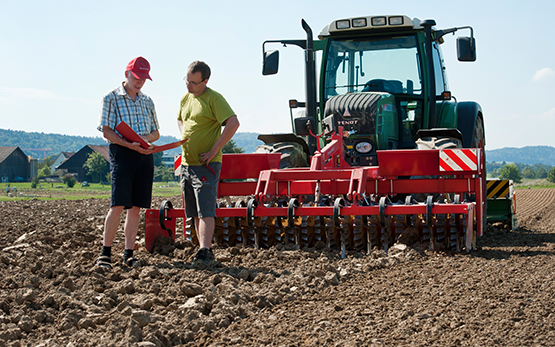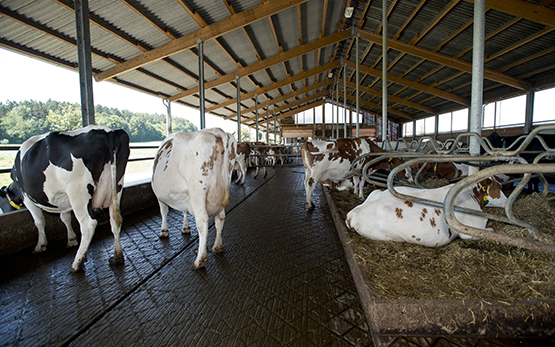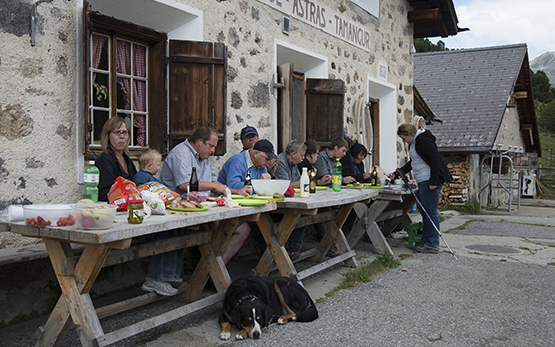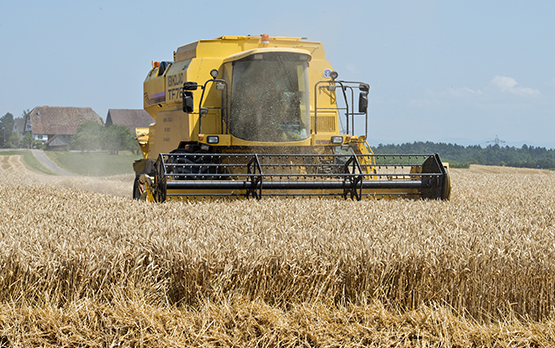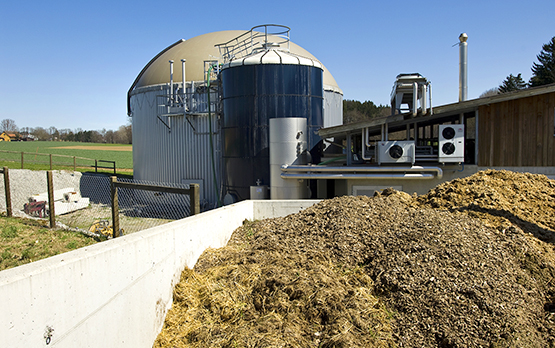Laurent M., Bougeard S., Caradec L., Ghestem F., Albrecht M., Brown M. J. F., De Miranda J., Karise R., Knapp J., Serrano J., Potts S. G., Rundlöf M., Schwarz J., Attridge E., Babin A. et autres
Novel indices reveal that pollinator exposure to pesticides varies across biological compartments and crop surroundings.
Science of the Total Environment, 927, 2024, 1-12.
Masson S.
Perspektiven für die Umsetzung des integrierten Pflanzenschutzes in der Schweiz durch innovative Landwirtegruppen.
Dans: Sitzung der Trägerschaft, Kommunikationsgruppe und Begleitgruppe PestiRed. 21. März, Ed. IP Suisse, Zollikofen. 2024, 1-4.
Masson S., Buchmann J., Bütler A., Cadot S., De Jong A.V., Mathys P., Rueda Ayala V. P., Seiler A., Steinger T., Vogelgsang S., Wirth J., Zorn A., Jeanneret P.
Rendement et IFT entre parcelles innovantes et témoin.
Dans: Sitzung der Trägerschaft, Kommunikationsgruppe und Begleitgruppe PestiRed. 21 mars, Ed. IP Suisse, Zollikofen. 2024, 1.
Masson S., Wassef J., Bütler A., Cadot S., Rueda Ayala V. P., Steinger T., Vogelgsang S., Wirth J., Zorn A., Jeanneret P.
Mesures mises en oeuvre sur les parcelles PestiRed de 2020 à 2022.
Dans: Sitzung der Trägerschaft, Kommunikationsgruppe und Begleitgruppe PestiRed. 21 mars, Ed. IP Suisse, Zollikofen. 2024, 1.
Buchmann J., de Jong A.V., Seiler A., Masson S., Rueda Ayala V. P., Jeanneret P., Wirth J.
PestiRed : Désherbage selon des principes des la protection phytosanitaire intégrée.
Dans: Sitzung der Trägerschaft, Kommunikationsgruppe und Begleitgruppe PestiRed. 21 mars, Ed. IP Suisse, Zollikofen. 2024, 1.
Babin A., Schurr F., Delannoy S., Fach P., Huyen Ton Nu Nguyet M., Bougeard S., de Miranda J., Rundlöf M., Wintermantel D., Albrecht M., Attridge E., Knauer A.
Distribution of infectious and parasitic agents among three sentinel bee species across European agricultural landscapes.
Scientific Reports, 14, 2024, 1-20.
Marja R., Albrecht M., Herzog F., Öckinger E., Segre H., Kleijn D., Batary P.
Quantifying potential trade-offs and win-wins between arthropod diversity and yield on cropland under agri-environment schemes: A meta-analysis.
Journal of Environmental Management, 353, 2024, 1-9.
Proesmans. W., Felten E., Laurent E., Albrecht M., Nathan C., Labonté A., Maurer C., Paxton R., Schweiger O., Szentgyörgyi H., Vanbergen A.
Urbanisation and agricultural intensification modulate plant–pollinator network structure and robustness.
Functional Ecology, In Press, 2024, 1-14.
Schwarz J., Knauer A., Alaux C., Barascou L., Barraud A., Dievart V., Ghazoul J., Michez D., Albrecht M.
Diverse pollen nutrition can improve the development of solitary bees but does not mitigate negative pesticide impacts.
Science of the Total Environment, 912, 2024, 1-15.
Knauer A., Naef C., Albrecht M.
Pesticide hazard, floral resource availability and natural enemies interactively drive the fitness of bee species depending on their crop fidelity.
Science of the Total Environment, 922, 2024, 1-8.
Ammann L., Bosem-Baillod A., Herzog F., Frey D., Entling M., Albrecht M.
Spatio-temporal complementarity of floral resources sustains wild bee pollinators in agricultural landscapes.
Agriculture, Ecosystems & Environment, 359, 2024, 1-11.
a Marca A.
Flower strips in vineyards: promoting wild bees: Master's thesis.
Ed. ETH Zürich, 2023, 43 pp.
Porfido P.
Risk of plant protection products to wild bees in vineyards with sown wildflower strips compared to vineyards with natural vegetation: Master's thesis.
Ed. ETH Zürich, 2023, 40 pp.
Nicholson C., Knapp J., Kiljanek T., Albrecht M., Chauzat M., Costa C., De la Rua P., Klein A., Mänd M., Potts S., Schweiger O., Bottero I., Cini E., de Miranda J., Di Prisco G. et autres
Pesticide use negatively affects bumble bees across European landscapes.
Nature, In Press, 2023, 1-24.
Albrecht M., Bossart S., Tschanz P., Keller T., Sutter L.
Grassland extensification enhances nest densities of ground-nesting wild bees.
Journal of Applied Ecology, 00, 2023, 1-11.
Bütler A., Zorn A.
Renoncer aux PPh dans les cultures de blé et de colza en vaut-il la peine ?
UFA-Revue, 11, 2023, 56-58.
autres langues: allemand
Zorn A., Bütler A., Mathys P.
Wirtschaftlichkeit des Verzichts auf Pflanzenschutzmittel bei Weizen und Raps: Ergebnisse der ersten zwei Erntejahre aus dem Projekt PestiRed.
Agroscope Science, 169, 2023, 1-31.
Schauer A., Bianco N., Yañez O., Brown A., Albrecht M., Neumann P.
Deformed wing virus prevalence in solitary bees put to the test: An experimental transmission study.
Frontiers in Ecology and Evolution, 11, 2023, 1-11.
Alejandre E. M., Scherer L., Guinée J. B., Aizen M. A., Albrecht M., Balzan M. V., Bartomeus I., Bevk D., Burkle L. A., Clough Y., Cole L. J., Delphia C. M., Dicks L. V.
Characterization factors to assess land use impacts on Pollinator abundance in life cycle assessment.
Environmental Science & Technology, 57, (8), 2023, 3445-3454.
Bottero I., Dominik C., Schweiger O., Albrecht M., Attridge E., Brown M. J. F., Cini E., Costa C., De la Rúa P., de Miranda J. R., Di Prisco G., Dzul Uuh D., Hodge S., Ivarsson K., Knauer A. et autres
Impact of landscape configuration and composition on pollinator communities across different European biogeographic regions.
Frontiers in Ecology and Evolution, 11, 2023, 1-16.
Báez Senties G.
Nutzniesser im Bienennest.
Schweizerische Bienen-Zeitung, 6, 2023, 17-19.
Studer A., Jeanneret P., Jacot-Ammann K.
Alternative Ansätze der Blattlausbekämpfung in Zuckerrüben.
Ed. Bundesamt für Landwirtschaft BLW, Januar, 2023, 43 pp.
autres langues: anglais
Jeanneret P., Buchmann J., Cadot S., de Jong A.-V., Seiler A., Steinger T., Vogelgsang S., Wirth J., Zorn A.
Nützlinge am Rand von Parzellen mit und ohne innovativem und agrarökologischem Ansatz.
Dans: Agroscope-internes Meeting PSM-Ressourcenprojekte. 24. Januar, Ed. Agroscope, Walierhof. 2023.
Tschanz P., Vogel S., Walter A., Keller T., Albrecht M.
Nesting of ground-nesting bees in arable fields is not associated with tillage system per se, but with distance to field edge, crop cover, soil and landscape context.
Journal of Applied Ecology, 60, (1), 2023, 158-169.
Jacot-Ammann K.
Blühstreifen für Bestäuber und andere Nützlinge.
Dans: Pflanzenschutz im nachhaltigen Ackerbau. 10. Auflage, Ed. Edition lmz, 2022, 394-395.
Zorn A., Clémence S.
Évaluation de mesures alternatives de protection des plantes : Enquête auprès des exploitations du projet de ressources PestiRed.
Agroscope Science, 141, 2022, 1-31.
autres langues: allemand
Eckerter P. W., Albrecht M., Herzog F., Entling M.H.
Floral resource use and fitness consequences for two solitary bee species in agricultural landscapes.
Basic and Applied Ecology, 65, 2022, 1-15.
Albrecht M.
L'habitat des insectes renforce la pollinisation et la production agricole.
12 décembre, 2022, 2 pp.
autres langues: allemand
Hodge S., Schweiger O., Klein A. M., Potts S. G., Costa C., Albrecht M., de Miranda J., Mand M., De la Rua P., Rundlöf M., Attridge E., Dean R. R., Bulet P., Michez D., Paxton R. J. et autres
Design and planning of a transdisciplinary investigation into farmland pollinators: Rationale, co-design, and lessons learned.
Sustainability, 14, (17), 2022, 1-30.
Knauer A., Gallmann J., Albrecht M.
Bee Tracker—an open-source machine learning-based video analysis software for the assessment of nesting and foraging performance of cavity-nesting solitary bees.
Ecology and Evolution, 12, (3), 2022, 1-8.
Knauer A., Alaux C., Allen M. J., Dean R. R., Dievart V., Glauser G., Klijanek T, Michez D., Schwarz J., Tamburini G., Wintermantel D., Klein A.-M., Albrecht M.
Nutritional stress exacerbates impact of a novel insecticide on solitary bees' behaviour, reproduction and survival.
Proceedings of the Royal Society B: Biological Sciences, 289, (1984), 2022, 1-9.
Brönnimann V., Jacot-Ammann K., Jeanneret P.
Nützlinge statt Pestizide im Zuckerrübenanbau: Pilotprojekt 2021.
Ed. Agroscope, Zürich. 11. Februar, 2022, 23 pp.
Fried G., Le Corre V., Rakotoson T., Buchmann J., Germain T., Gounon R., Royer H., Biju-Duval L., Felten E., Vieren E., Chauvel B.
Impact of new management practices on arable and field margin plant communities in sunflower, with an emphasis on the abundance of Ambrosia artemisiifolia (Asteraceae).
Weed Research, 62, (2), 2022, 134-148.
Straub L., Strobl V., Yanez O., Albrecht M., Brown M. J. F., Neumann P.
Do pesticide and pathogen interactions drive wild bee declines?
International Journal for Parasitology: Parasites and Wildlife, 18, 2022, 232-243.
Zorn A., Clémence S. , Buchmann J., de Jong A.-V., Masson S., Steinger T., Seiler A., Vogelgsang S., Wirth J., Jeanneret P.
Beurteilung alternativer Pflanzenschutzmassnahmen: Erste Ergebnisse aus dem Ressourcenprojekt PestiRed.
Dans: 45. Agrarökonomietagung. 4. Oktober, Ed. Agroscope, Tänikon. 2022.
Buchmann J., de Jong A.-V., Seiler A., Masson S., Zorn A., Wirth J., Steinger T., Vogelgsang S., Clémence S.
Pesticide use reduction with alternative biodiversity-friendly practices: A case study in Switzerland.
Dans: INTECOL2022: Frontiers in Ecology: Science & Society. 2. septembre, Geneva. 2022, 1-19.
Maurer C., Sutter L., Martinez Nunez C., Pellissier L., Albrecht M.
Different types of semi-natural habitat are required to sustain diverse wild bee communities across agricultural landscapes.
Journal of Applied Ecology, online, (2 August), 2022, 1-12.
Zorn A., Clémence S., Masson S., Jeanneret P.
PestiRed: Ein Schweizer Projekt zur Reduktion von PS-Mitteln.
Der Pflanzenarzt, (8), 2022, 6-8.
Jacot-Ammann K., Bättig D.
Blühende Rebberge für Mensch und Natur.
Ed. Forschungsinstitut für biologischen Landbau FiBL, Frick. 2022, 52 pp.
Buchmann J., Masson S., de Jong A.-V., Seiler A., Rueda Ayala V. P., Jeanneret P., Wirth J.
PestiRed : Weed management based on IPM principles.
Dans: 19th European Weed Research Society Symposium. 20. - 23. Juni, Ed. European Weed Research Society, EWRS Athens. 2022.
Eckerter P., Albrecht M., Bertrand C., Gobet E., Herzog F., Pfister S., Tinner W., Entling M.
Effects of temporal floral resource availability and non‑crop habitats on broad bean pollination.
Landscape Ecology, (37), 2022, 1-14.
Dimitry Wintermantel, Maria-Helena Pereira-Peixoto, Nadja Warth, Kristin Melcher, Michael Faller, Joachim Feurer, Matthew J. Allan, Robin Dean, Giovanni Tamburini, Knauer A., Schwarz J., Albrecht M., Alexandra-Maria Klein
Flowering resources modulate the sensitivity of bumblebees to a common fungicide.
Science of the Total Environment, 829, 2022, 1-11.
Schwarz J., Knauer A., Allan M., Dean R., Ghazoul J., Tamburini G., Wintermantel D., Klein A.-K., Albrecht M.
No evidence for impaired solitary bee fitness following pre-flowering sulfoxaflor application alone or in combination with a common fungicide in a semi-field experiment.
Environment International, 164, 2022, 1-11.
Allen-Perkins A., Magrach A., Dainese M., Albrecht M., Sutter L., Herzog F., Jeanneret P., Nates Parra G., Magalhaes Pigozo C., Bartomeus I.
CropPol: A dynamic, open and global database on crop pollination.
Ecology, 103, (3), 2022, 1-8.
Zia H., Von Ah U., Meng Y. H., Schmidt R., Kerler J., Fuchsmann P.
Biotechnological formation of dairy flavor inducing δ-lactones from vegetable oil.
Food Chemistry, 13, 2022, 1-11.
Bättig D., Ramseier H., Luka H., Herzog F., Jacot-Ammann K.
Blühstreifen für Bestäuber: Umfrage zeigt weitgehende Zufriedenheit in der Praxis.
Agrarforschung Schweiz, 13, 2022, 26-33.
Zorn A., Clémence S., Seiler A., de Jong A.-V., Buchmann J., Masson S., Steinger T., Vogelgsang S., Wirth J., Jeanneret P.
Rentabilité & acceptation de mesures phytosanitaires alternatives.
Dans: 9. Nationale Ackerbautagung. Ed. Plateforme Grandes cultures Suisse PAG-CH, 2022.
autres langues: allemand
Meier L., Clémence S., Zorn A.
Nutzung von Daten aus elektronischen Feldkalendern.
Dans: Informatik in der Land-, Forst- und Ernährungswirtschaft Fokus: Künstliche Intelligenz in der Agrar- und Ernährungswirtschaft. Volume P-317, Ed. Gesellschaft für Informatik e.V. (GI), Köllen Druck+Verlag GmbH, Bonn. 2022, 189-194.


